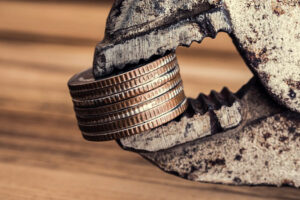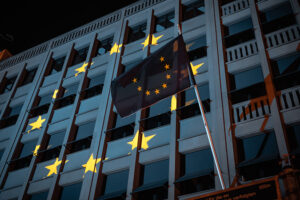The European dream of ecological reshoring
The coronavirus pandemic highlighted Europe's excessive dependence on Asia, in particular China and India, in the production of medical equipment and devices (e.g., antibacterial gels, masks or respirators), as well as active substances that are key ingredients in popular drugs. While in the 80s and 90s about 60% of all active substances were produced in Europe, this situation changed in 2010 and now even 60% of total production takes place in China and India.
About the Author
 Christopher Dembik - French economist of Polish origin. Is a global head of macroeconomic research at a Danish investment bank Saxo Bank (a subsidiary of the Chinese company Geely serving 860 HNW customers around the world). He is also an advisor to French parliamentarians and a member of the Polish think tank CASE, which took first place in the economic think tank in Central and Eastern Europe according to a report Global Go to Think Tank Index. As a global head of macroeconomic research, he supports branches, providing analysis of global monetary policy and macroeconomic developments to institutional and HNW clients in Europe and MENA. He is a regular commentator in international media (CNBC, Reuters, FT, BFM TV, France 2, etc.) and a speaker at international events (COP22, MENA Investment Congress, Paris Global Conference, etc.).
Christopher Dembik - French economist of Polish origin. Is a global head of macroeconomic research at a Danish investment bank Saxo Bank (a subsidiary of the Chinese company Geely serving 860 HNW customers around the world). He is also an advisor to French parliamentarians and a member of the Polish think tank CASE, which took first place in the economic think tank in Central and Eastern Europe according to a report Global Go to Think Tank Index. As a global head of macroeconomic research, he supports branches, providing analysis of global monetary policy and macroeconomic developments to institutional and HNW clients in Europe and MENA. He is a regular commentator in international media (CNBC, Reuters, FT, BFM TV, France 2, etc.) and a speaker at international events (COP22, MENA Investment Congress, Paris Global Conference, etc.).
Supply chain reshoring
The crisis has made European governments and society aware of the importance of reducing economic and health dependence on the rest of the world. Emmanuel Macron called for "European and national sovereignty" and for "complete independence" of certain segments of the medical markets. Others, apparently inspired by the financial incentives of the Japanese government to relocate the production of Japanese companies from China, went even further and called for the creation of a European industrial policy aimed at transferring as much of the business as possible to Europe.
Reshoring supply chains is nothing new; this idea is as old as globalization itself. In recent years, however, it has returned to favor due to the increase in protectionism - and in the last few months it has gained even more popularity in the context of a pandemic. From the 2016 Trump campaign to today's campaign for "aggressive" supply chain reshoring in the UK, there is a widespread belief that the more products and goods produced locally, the more the economy will improve.
In theory, moving production to a country is a very attractive idea. It should provide many benefits: reindustrialisation, new jobs, reduction of supply chain disruption in the event of a new external shock, such as a virus, and - above all - a sustainable environmental economy. However, the question is: does Europe have the means to realize its ambitions and increase its self-sufficiency?
The trade balance in the euro area gives us an initial answer. It shows the difference between selling and buying goods abroad and is used to assess the relative dependence of imports and exports on the rest of the world.
Trade in the euro area is characterized by a huge surplus, largely due to the fact that during the twelve months ending in March 2020, Germany recorded a surplus of EUR 338 billion, representing around 2,8% of the GDP of the euro area. This is the second highest trade surplus in the world after China. In other words, Europeans sell more than they buy abroad (outside the Union). The EU free trade system is therefore characterized by a high dependence on exports and to a lesser extent on imports - which means that the EU is essentially self-sufficient, in particular for basic agricultural products.
That said, can the EU regain autonomy for goods and products for which it is not yet self-sufficient, such as medical equipment or printed circuit boards that are an essential element of smartphones and computers? This is highly uncertain.
Even if it is able to regain this autonomy, the relocation of production is not as wonderful as it is believed to be. This requires resources, skills, leadership and a tolerance to higher costs - even ignoring potential retaliation by China. This solution assumes that the transferring countries have the necessary workforce and know-how, which is not always possible for many products and goods.
Creating a solid industrial base requires long-term vision, political leadership and the ability to work with the private sector. It is impossible to order the transfer of production to the country - it is a gradual and long-term process. It involves long-term and risky activities, e.g. supply chain reorganization, which can take many years.
In addition, as we all know, nothing is free in economics. Reshoring usually leads to higher costs for businesses, which in turn are systematically passed on to consumers. It is therefore important to adopt a coordinated European approach to generate economies of scale and, if possible, reduce costs associated with relocation. Euphemistically speaking, Europe is not moving in this direction.
In the context of the seven-year negotiations on the multiannual financial framework and the "New EU Generation" instrument, the European Commission has proposed to extend the existing Horizon Europe program, which aims, inter alia, strengthening autonomy in strategic supply chains.
If this project is approved by the Council, the total package could amount to EUR 94,4 billion for 2021-2027, compared to an initial cost of EUR 80,9 billion. The package to reduce EU dependence on external trade would therefore, at best, correspond to 0,08% of EU GDP per year. Even after incorporating other programs, such as those related to the fight against climate change or the creation of new industrial clusters, it is just a drop in the ocean of needs. The EU's ambition to increase self-sufficiency is only empty promises.






















![Forex Club – Tax 9 – Settle tax on a foreign broker [Download the Application] Forex Club - Tax 9](https://forexclub.pl/wp-content/uploads/2024/02/Forex-Club-Podatek-9-184x120.jpg?v=1709046278)
![Trading View platform – solutions tailored to the needs of traders [Review] trading view review](https://forexclub.pl/wp-content/uploads/2024/03/trading-view-recenzja-184x120.jpg?v=1709558918)
![How to connect your FP Markets account to the Trading View platform [Guide] fp markets trading view](https://forexclub.pl/wp-content/uploads/2024/02/fp-markets-trading-view-184x120.jpg?v=1708677291)
![How to invest in ChatGPT and AI? Stocks and ETFs [Guide] how to invest in chatgpt and artificial intelligence](https://forexclub.pl/wp-content/uploads/2023/02/jak-inwestowac-w-chatgpt-i-sztuczna-inteligencje-184x120.jpg?v=1676364263)


![WeWork – the anatomy of the collapse of a company valued at $47 billion [WeWork, part II] wework bankruptcy story](https://forexclub.pl/wp-content/uploads/2024/04/wework-bankructwo-historia-184x120.jpg?v=1711729561)
![Adam Neumann – the man who screwed up Softbank [WeWork, part AND] adam neumann wework](https://forexclub.pl/wp-content/uploads/2024/04/adam-neumann-wework-184x120.jpg?v=1711728724)





![How to transfer shares to another brokerage office [Procedure description] how to transfer shares to another brokerage house](https://forexclub.pl/wp-content/uploads/2024/03/jak-przeniesc-akcje-do-innego-biura-maklerskiego-184x120.jpg?v=1709556924)

![The most common mistakes of a beginner trader - Mr Yogi [VIDEO] Scalping - The most common mistakes of a beginner trader - VIDEO](https://forexclub.pl/wp-content/uploads/2024/03/Scalping-Najczestsze-bledy-poczatkujacego-tradera-VIDEO-184x120.jpg?v=1711601376)
![Learning patience: No position is also a position - Mr Yogi [VIDEO] Scalping - Learning patience - No position is also a position - VIDEO](https://forexclub.pl/wp-content/uploads/2024/03/Scalping-Nauka-cierpliwosci-Brak-pozycji-to-tez-pozycja-VIDEO-184x120.jpg?v=1710999249)
![When to exit a position and how to minimize losses - Mr Yogi [VIDEO] Scalping - When to exit a position and how to minimize losses - VIDEO](https://forexclub.pl/wp-content/uploads/2024/03/Scalping-Kiedy-wyjsc-z-pozycji-i-jak-minimalizowac-straty-VIDEO-184x120.jpg?v=1710336731)

















